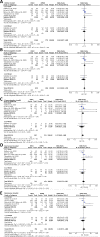Systematic evaluation of TP53 codon 72 polymorphism associated with onset and progression of oral potentially malignant disorders
- PMID: 37697274
- PMCID: PMC10496165
- DOI: 10.1186/s12903-023-03316-0
Systematic evaluation of TP53 codon 72 polymorphism associated with onset and progression of oral potentially malignant disorders
Abstract
Background: Recently, a systematic review and meta-analysis demonstrated that overexpression of p53 immunoprotein was significantly associated with progression risk of oral potentially malignant disorders (OPMD). However, the results of investigations on TP53 genetic typing in OPMD were inconsistent and inconclusive.
Methods: A systematic evaluation was conducted to identify all eligible case-control studies on the association of TP53 codon 72 polymorphism with both onset and progression of OPMD.
Results: A total of 768 OPMD patients and 1173 healthy individuals were identified from 12 eligible case-control studies on TP53 codon 72 polymorphism OPMD onset. In overall and subgroup analyses, no significantly risk of OPMD onset was observed in the cases for genetic models including allele C vs. G, homozygote CC vs. GG, heterozygote GC vs. GG, dominant GC + CC vs. GG, and recessive CC vs. GG + GC (all P-value of association test > 0.05). Further, a total of 465 OPMD patients and 775 oral squamous cell carcinoma (OSCC) ones were identified from 8 eligible case-control studies on this polymorphism in OPMD progression to OSCC. The analyses revealed that there was also no significantly risk of OPMD progression in the cases for the genetic models (all P-value of association test > 0.05).
Conclusion: Our data of a pooled-analysis indicates that TP53 codon 72 polymorphism may not act as genetic factor for the risk of OPMD onset and progression. Combined with the conclusion by a systematic review and meta-analysis, we put forward a new opinion that TP53 genetic typing cloud not influence p53 protein expression in OPMD.
Keywords: Meta-analysis; Oral cancer; Oral potentially malignant disorders; Single-nucleotide polymorphisms; TP53.
© 2023. BioMed Central Ltd., part of Springer Nature.
Conflict of interest statement
The authors declare no competing interests.
Figures


References
-
- Warnakulasuriya S, Kujan O, Aguirre-Urizar JM, et al. Oral potentially malignant disorders: a consensus report from an international seminar on nomenclature and classification, convened by the WHO Collaborating Centre for Oral Cancer. Oral Dis. 2021;27:1862–1880. doi: 10.1111/odi.13704. - DOI - PubMed
-
- Shridhar K, Aggarwal A, Walia GK, Gulati S, Geetha AV, Prabhakaran D, et al. Single nucleotide polymorphisms as markers of genetic susceptibility for oral potentially malignant disorders risk: Review of evidence to date. Oral Oncol. 2016;61:146–151. doi: 10.1016/j.oraloncology.2016.08.005. - DOI - PMC - PubMed
Publication types
MeSH terms
Substances
LinkOut - more resources
Full Text Sources
Medical
Research Materials
Miscellaneous

